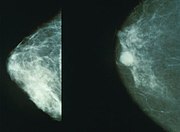 Some widely prescribed drugs for depression provide relief in extreme cases but are no more effective than placebo pills for most patients, according to a new analysis released Tuesday.
Some widely prescribed drugs for depression provide relief in extreme cases but are no more effective than placebo pills for most patients, according to a new analysis released Tuesday.
The new report, appearing in The Journal of the American Medical Association, reviews data from previous trials on two types of drugs and finds that their effectiveness varies according to the severity of the depression being treated.

 Health Glance
Health Glance The Senior Medicare Patrol is one of the least-known forces in the government's effort to eliminate such fraud, which drains billions of dollars a year. But it is seen as a valuable part of the Obama administration's bid to overhaul health care and bring down costs.
The Senior Medicare Patrol is one of the least-known forces in the government's effort to eliminate such fraud, which drains billions of dollars a year. But it is seen as a valuable part of the Obama administration's bid to overhaul health care and bring down costs. Breast cancer is not a single disease but a collection of at least five separate conditions that differ in prognosis and response to treatment, a detailed genetic study has revealed.
Breast cancer is not a single disease but a collection of at least five separate conditions that differ in prognosis and response to treatment, a detailed genetic study has revealed. Vitamin C could play an essential role in the manufacture of stem cells for treating human diseases, new research suggests. The vitamin boosts the reprogramming of adult cells to give them the properties of embryonic stem cells.
Vitamin C could play an essential role in the manufacture of stem cells for treating human diseases, new research suggests. The vitamin boosts the reprogramming of adult cells to give them the properties of embryonic stem cells. How convenient. That means the former head of the CDC was very likely cultivating a relationship with Merck all these years, and now comes the big payoff: Heading up a $5 billion division that sells cervical cancer vaccines (like Gardasil), chickenpox vaccines and of course H1N1 swine flu vaccines, too.
How convenient. That means the former head of the CDC was very likely cultivating a relationship with Merck all these years, and now comes the big payoff: Heading up a $5 billion division that sells cervical cancer vaccines (like Gardasil), chickenpox vaccines and of course H1N1 swine flu vaccines, too.






























